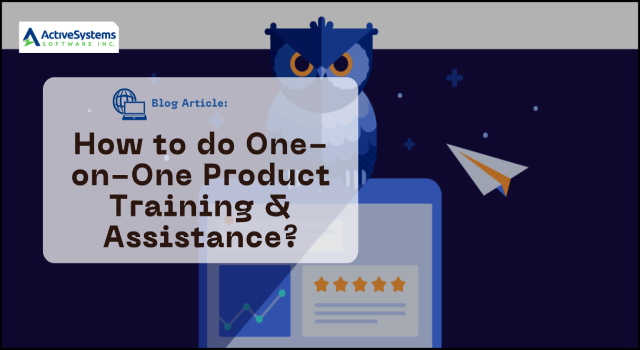Every business wants one thing – happy customers and One-on-One Product Training & Assistance helps the customer appreciate your service. This happens when you have the perfect combination of a great product and, importantly, a team that has the product knowledge needed to support and satisfy customers. We’re sure you have the product side down, but for your business, in-depth product knowledge is an essential skill that every customer-facing team member should have. From features to best practice, it’s one of the best ways to ensure that you’re delivering an exceptional customer experience. But how can you easily and efficiently get your employees up-to-speed on your product? The answer: product knowledge training.
What does product knowledge mean?
Product knowledge is a skill where your employees fully understand and can effectively communicate with customers about your product, its features, benefits, uses, and support needs. Product knowledge is a critical skill that your customer-facing team should know as it:
1. Improves sales
Having the information and a better understanding of your product, your Sales team can effectively talk to prospective customers about the value of your product, the best way to present features that impress, and be able to share how your product will work for them.
2. Better support your customers
It’s inevitable that with every customer they will have a question or two. They will need to rely on your support teams. By having a detailed and thorough knowledge of your product and its technical functionality, your team members will be able to answer any question that arises in a fast and competent fashion. One-on-One Product Training & Assistance One-on-One Product Training & Assistance
3. Increases product adoption and retention
By adequately training your employees, you’re giving them an indispensable skill – the ability to train your customers. Your staff can effectively educate customers on how to use your product, thus increasing product adoption, and support them throughout their journey with your business so that they excel with your product and stick around for longer. One-on-One Product Training & Assistance
4. Boosts customer and employee confidence
An under-appreciated, but substantial advantage of enhanced product knowledge is the boost of confidence it gives to both your customers and employees. For your customers, they can rest assured knowing that you can meet their needs. For your employees, they have confidence in their abilities. They know they have the tools in hand to meet and exceed your customers’ expectations and handle any issue that comes their way.
Types of product knowledge
Product knowledge is an umbrella term. It doesn’t just focus on your product itself – although it’s a significant aspect, – in reality, there are a lot more strings to its bow. As an organization, your team becomes more powerful, more effective, and simply better when you offer all-encompassing product knowledge training, that includes:
Your target audience
Who is your product made for? How does it solve their problem/help them? What are their expectations for your product? When your teams know the answer to these questions, they can tailor the customer experience to the audience. They know who they are selling to and support, and critically, they know who is not a suitable customer for your organization, thus avoiding potential product fit issues down the line.
Your brand
Who are your main competitors? Are you the market leader? Is your product the affordable or the premium option? Is your organization corporate or casual? Creating a collective mindshare within your company about what it represents and how it’s perceived by customers, will once again help your employees adapt to an experience that the customer expects.
The customer journey
When a new customer signs up or buys your product, it’s key that the team members interacting with them know the journey they are about to take. This will give them a clear idea of their role in the customer’s lifecycle and what knowledge they should be sharing with the customer.
Features and functionality
Often the most focused on element, training your employees on what your product does is essential. It’s also critical that they know how to use it so they can fully understand its purpose and how customers are using it.
Common queries
What questions do your team members get asked the most? From sales snags to support queries, this helps prepare for the inevitable questions that are going to be asked.
Product Knowledge Training
The best way to ingrain product knowledge into employees is through developing a training strategy. There’s plenty of methods to do this: in-person sessions, handouts and guides, online training. Today we’re concentrating on how you can use all of these methods via a Learning Management System. An LMS is a perfect solution for organizations looking to train their growing workforce in an easy, efficient, scalable way. Here’s a simple walk-through of how an LMS can help your organization train its employees.
1. Create a consistent training program
Consistency is a universal struggle for businesses. Ensuring every employee gets the same high standard of product training can be a complicated task with the right tools. With an LMS, you can create courses that establish a baseline of knowledge and formalize the learning process so there are fewer information gaps.
2. Simple to use for both admins and employees
There is one critical factor that can make or break product knowledge training – simplicity. For an administrator managing and delivering training, the process needs to be fast and uncomplicated. And for employees, training needs to be accessible and learner-friendly. A great LMS will be purpose-built to be easy-to-use for all users. At LearnUpon, we always say employees should spend their valuable time learning your content — not our interface. Therefore, a user-friendly solution is key.
3. Scalable product knowledge training
If you’re trying to train a growing workforce, one that you expect to double or triple in the next few years, you’ll need to be able to scale the process. Meanwhile an LMS makes the job much more manageable. You can train your growing number of employees all online within one solution. Critically, learning can take place across such as multiple teams, locations, and time zones, allowing you to reach all employees.
4. Automate time-consuming workflows
One of the advantages of an LMS is that it saves your organization so much time. By automating workflows like adding users through an integration you can, for example:
- add a new employee to your HR system;
- automatically send their user information to your LMS where they are created as a user;
- auto-enroll them in the necessary courses or Learning Path (a group of courses);
- and sent automated notifications letting them know they have been added, are enrolled in training, and to remind them to complete a course
5. Mobile-responsive learning
Not all learners are tied to a desk or have time to learn at a desk. For on-the-go training, a mobile-friendly LMS allows your employees to log in on-site or on a break and brush up on their product knowledge.
6. Train how you want
An LMS makes training more dynamic. You can mix and match content to give a varied training experience for your employees. With video, audio, PDF, Word documents, slides, webinars… together they can create a comprehensive view of your product for your employees. Additionally, learning can be elective, mandatory, or a mix of both. Your employees can take obligatory courses for the most important product knowledge training, and opt-in to other content that they will find helpful.
7. Engaging training sessions
Not only should training be easily accessible for your employees, but it should also be motivating. They should feel encouraged to gain product knowledge. Employee training LMS’s have a number of features to tempt learners to continuously train. Gamification and social learning are two of the most popular. They make learning fun and a talking point within your organization.
8. Measurable training
An LMS enables you to do a very powerful thing – measure the impact your training. From course completions to exam performance, you can observe reports that show how product knowledge is helping your employees, In conclusion benefiting your customers. From the moment a new employee joins your organization to the interactions they have with your customers, product knowledge is a skill that needs to be focused on. By creating a product knowledge training strategy, you can help every employee get the information they need to perform at their best and, importantly, ensure that you have happy customers.
Source
www.learnupon.com


